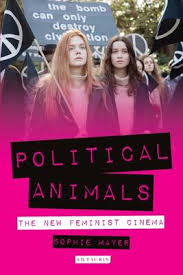Looking for more films that pass the Bechdel Test? Political Animals: The New Feminist Cinema is a fiercely political overview of a new generation of feminist filmmakers from Sophie Mayer. Turning its attention away from commercial film, this book offers an alternative narrative for understanding contemporary feminist cinema beyond the mainstream. Although the number of films covered – nearly 500 – prevents more detailed analysis of individual examples, Sofia Ropek Hewson salutes this comprehensive introduction to feminist cinema, which should contribute significantly to the watchlists of those interested in contemporary film, gender and feminism.
This review is part of a theme week marking International Women’s Day 2016. March is Women’s History Month and LSE is celebrating with LSE Women: Making History, focusing on #LSEwomen past, present and future. If you are interested in finding out more, please visit the LSE History blog.
Political Animals: The New Feminist Cinema. Sophie Mayer. I.B.Tauris. 2015.
 Sophie Mayer, academic and activist, has written a valuable overview of a new generation of feminist filmmakers. Political Animals: The New Feminist Cinema is firmly and cheeringly intersectional, and provides a timely riposte to commercial ‘queer’ cinema, which often ‘wears its social politics lightly’. The films analysed in Political Animals are, unsurprisingly, fiercely political, and committed to curating spaces and voices for women – particularly women at the marginalised intersections of class, race and gender. Rather than absorbing them into contemporary consumerism or ‘the heteropatriarchy’ (referring to societal domination by heterosexual men), these filmmakers create new worlds, fantasies and futures for their characters. Mayer cites bell hooks on how to transform culture: we must ‘embrace the avant garde, here is where we’ll find radical possibility’, rather than in ‘conventional mass media’ and commercial films. Mayer creates an alternative filmic feminist narrative, sweeping through hundreds of independent films.
Sophie Mayer, academic and activist, has written a valuable overview of a new generation of feminist filmmakers. Political Animals: The New Feminist Cinema is firmly and cheeringly intersectional, and provides a timely riposte to commercial ‘queer’ cinema, which often ‘wears its social politics lightly’. The films analysed in Political Animals are, unsurprisingly, fiercely political, and committed to curating spaces and voices for women – particularly women at the marginalised intersections of class, race and gender. Rather than absorbing them into contemporary consumerism or ‘the heteropatriarchy’ (referring to societal domination by heterosexual men), these filmmakers create new worlds, fantasies and futures for their characters. Mayer cites bell hooks on how to transform culture: we must ‘embrace the avant garde, here is where we’ll find radical possibility’, rather than in ‘conventional mass media’ and commercial films. Mayer creates an alternative filmic feminist narrative, sweeping through hundreds of independent films.
Political Animals is divided into ten chapters that cover subjects including animals in films and how they are analogous to women in dominant culture; the symbolic and literal importance of water; women at (and against) war; runaways; costume dramas; fantasy; and sexual politics. Although the book’s sustained focus on independent films is its strength, Mayer also encourages readers to reconsider commercially successful films like The Hunger Games (2012-15). Mayer describes Jennifer Lawrence’s character, Katniss Everdeen, as an archetypal ‘solo strong female protagonist’. The ‘sexy and solitary’ woman has been a ‘fantasy figure for viewers of all genders’. Unlike the bands of men in The Big Short (2016) or Ocean’s Eleven (2001), these protagonists operate alone, often miserably, and are frequently subjected to sexualised violence. Mayer dismisses French film Blue is the Warmest Colour (2013) as ‘a male fantasy of adolescent desire’ and Fifty Shades of Grey (2015) as ‘sadistic voyeurism and […] the romance of internalised sexism’. Instead, she urges us to watch Wendy and Lucy (2008), a story about an unemployed woman and her touching friendship with her dog, or Pumzi (2010), a Kenyan science fiction film about water scarcity – both of which made it onto my new, long, to-watch list.
A chapter on fantasy is particularly compelling. Mayer remarks incisively that ‘history and fantasy are not, and for feminists cannot be, distinct’. Histories have been established by men and often omit crucial stories and potentialities. Rewriting history is feminist fantasy play, but it is also about imagining our futures. Mayer quotes Jacqueline Rose (who recently spoke at LSE Lit Fest 2016) on dream spaces and the importance of fantasy, arguing that feminism has ‘neglected the play of the unconscious’. For Mayer and for Rose, ‘taking back the night’ means both reclaiming public space and dream space. Mayer argues convincingly that our challenge is to both ‘reclaim the night’ from ‘external violence’ and reclaim our own fantasies and desires from violent and pernicious internalised sexism.
The strength of affective relationships is also a key theme of Mayer’s book. Loving relationships are a powerful counterbalance to heteropatriarchal capitalism and can act as ‘a form of resistance to, or way out of, its narrow confines’. But Mayer doesn’t write about romcoms and ‘their white liberal feminist twists’; rather, she focuses on ‘re-integration’. ‘Entwining love, justice and togetherness in multiple ways’, Mayer argues that ‘feminist cinema re-integrates what dominant culture separates’. Romantic, erotic, friendly and familial love are woven together in feminist films. In a particularly engaging analysis of Shonali Bose’s Margarita with a Straw (2014), Mayer writes about how mobility and networks are the film’s dominant themes, and about the importance of moving across borders and identities. Affective relationships, according to the book, are the means of both strength and mobility. Believing that ‘love proceeds through the verb’, Mayer quotes Luce Irigaray: ‘Love builds scaffolding, provides for transports between people and in the world.’ Accordingly, Mayer writes that queer films often focus on a couple and how their love can ‘build scaffolding for their entire community and provide transport across borders’.

Image Credit: RayneVanDunem
Political Animals is expansive in its treatment of feminist films. Although their literal reach might be small, their scope is all-encompassing. Rather than being ‘obliterated by blockbuster cinema’, Mayer wants filmmakers to harness the energy or ‘radiation’ of these films, galvanising us to ‘spawn’ our own media.
Mayer has written a comprehensive introduction to feminist cinema of the last decade; her book should be required reading for film students as a follow-up to B. Ruby Rich’s Chick Flicks (1998). But, ultimately, Political Animals covers a daunting number of films: almost 500 in its 200 pages. This breadth sometimes hindered my comprehension and enjoyment of the book. I would have preferred a sustained analysis of a few films in each chapter rather than fleeting descriptions of dozens; perhaps, though, I’m biased, because I’ve only seen a fraction of the films included. Mayer does acknowledge her luck and privilege in the introduction, writing that her book is ‘a postcard saying ‘‘wish you were here’’’. Unfortunately, most of us aren’t: London is the locus for feminist and queer film festivals, and independent feminist films are rarely released nationwide.
Political Animals was released as The Revenant (2016) was garnering Oscar nominations. The Revenant has been praised by male critics as ‘unthinkingly, aggressively masculine’ and ‘thrilling and painful’, and described by Carole Cadwalladr in the Guardian as ‘meaningless pain porn’. My frustration that Suffragette (2015) was ignored in the main awards cycle was exacerbated by the plaudits for The Revenant. Peter Bradshaw also recently wrote about the persistent genre of ‘Viagra cinema’, where films pair older men with much younger women, like Youth (2016) with Michael Caine (82) and Harvey Keitel (76) leering at Mădălina Diana Ghenea (27).
In this climate, or any climate, I salute Mayer’s call for the wider distribution of independent feminist films. I would love to watch more films that consider women’s stories to be important – #filmherstory on Twitter has some great suggestions. More cheerfully, Mayer notes the increased importance of audiences and viewers in her conclusion: crowd-funding films that are released online will provide wider access to new feminist filmmakers. Until then, apply the Bechdel and Sexy Lamp tests to films you see in your local multiplex. And groan.
Sofia Ropek Hewson is a French PhD student at Cambridge, researching transgression and political literature. She tweets at @sofiahewson.
Note: This review gives the views of the author, and not the position of the LSE Review of Books blog, or of the London School of Economics.







